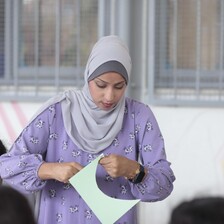The Electronic Intifada 20 July 2022

Gaza’s gold market has been badly harmed by a 15-year blockade.
APA imagesThe history of Gaza’s gold market has often been turbulent.
Among the many crises it has faced was World War I, when Britain’s armed forces caused major damage to the surrrounding area.
Israel’s 15-year blockade of Gaza means that the market’s future is now in doubt.
Like his father and grandfather, Adel Abu Sayma has spent much of his life working in the gold trade. With his agreement, his own sons have nonetheless opted to stay away from this profession.
“There has been no real demand for gold in Gaza for a long time,” Abu Sayma said. “People only buy gold when they are about to get married.”
Under local traditions, men give a “bride’s price” to their future wives when weddings are being planned. That money is then used to buy a dress and some valuable items.
Abu Sayma recalled that a bride-to-be would buy as much as six kilograms of gold before Gaza was subjected to a complete blockade in 2007. Today, the average amount bought is between 20 and 30 grams.
Couples often incur debts in order to pay for their weddings. To repay debt, it can be necessary to sell off gold at an early stage in their marriage.
“No profit”
“Gold is important for the economy of any independent country,” said Rafiq Ayyad, 85, a veteran trader. “That’s when there are no wars, occupations or sieges. Because of the deadly blockade, there is no profit to be made in Gaza.”
As Gaza has acute social problems, only a small minority of people can afford gold.
The rate of unemployment in Gaza is now among the world’s highest.
During the first four months of this year, unemployment stood at almost 47 percent. The average level of joblessness in 2006 – the year before Gaza was placed under a complete blockade – was approximately 35 percent.
Around 62 percent of the more than 2 million inhabitants in Gaza require food assistance. And more than 30 percent of Gaza’s households struggle to pay for basic educational needs, including school books and tuition fees, the UN monitoring group OCHA stated in a recent paper.
Since 2007, Israel has imposed harsh restrictions on the import and export of gold. For lengthy periods, the entry of gold has been completely banned.
The restrictions have meant that many of Gaza’s gold processing factories have ceased operations.
All that remains
The volume of trade undertaken at the gold market is just a fraction of what it used to be.
“Demand is small,” said Mahmoud Atwa from the Syndicate of Goldsmiths and Precious Metals Traders.
The gold market can be found beside the Great Mosque – also known as the al-Omari mosque – in Gaza City.
It is all that remains of Souq al-Qaysariyya, Arabic for “Caesar’s market.” Dating back to 1476 and based on Roman designs, the souq was originally used by leather and grain dealers.
The gold market itself opened during the Ottoman era.
Yasir Haboub, another veteran trader, noted how running the market under Israeli military occupation has always proven difficult.
After capturing Gaza in the 1967 War, Israel imposed a tax on the gold trade in an effort to harm it.
The market kept going despite such obstacles. It even enjoyed relative success in the years following the first intifada, the Palestinian uprising which lasted from 1987 to 1993.
“Gold traders had greater freedom to work and import more stock because the burdens of the occupation were reduced,” Haboub said. “These greater freedoms led to much greater activity in buying and selling gold. We had enough money to buy greater quantities of gold so that we could store it for the future.”
Palestinians who worked within Israel during those years were known to buy gold coins – as an investment.
Nearly 30,000 people from Gaza worked in Israel before the second intifada erupted in 2000. Now the number working in Israel is less than 10,000.
The sale of gold coins in Gaza’s market has been reduced to a trickle. And the days of a robust trade seem distant.
“Fewer and fewer people are buying gold,” Haboub added. “Instead, they have to spend what money they have on food and other necessities.”
Ruwaida Amer is a journalist based in Gaza.





